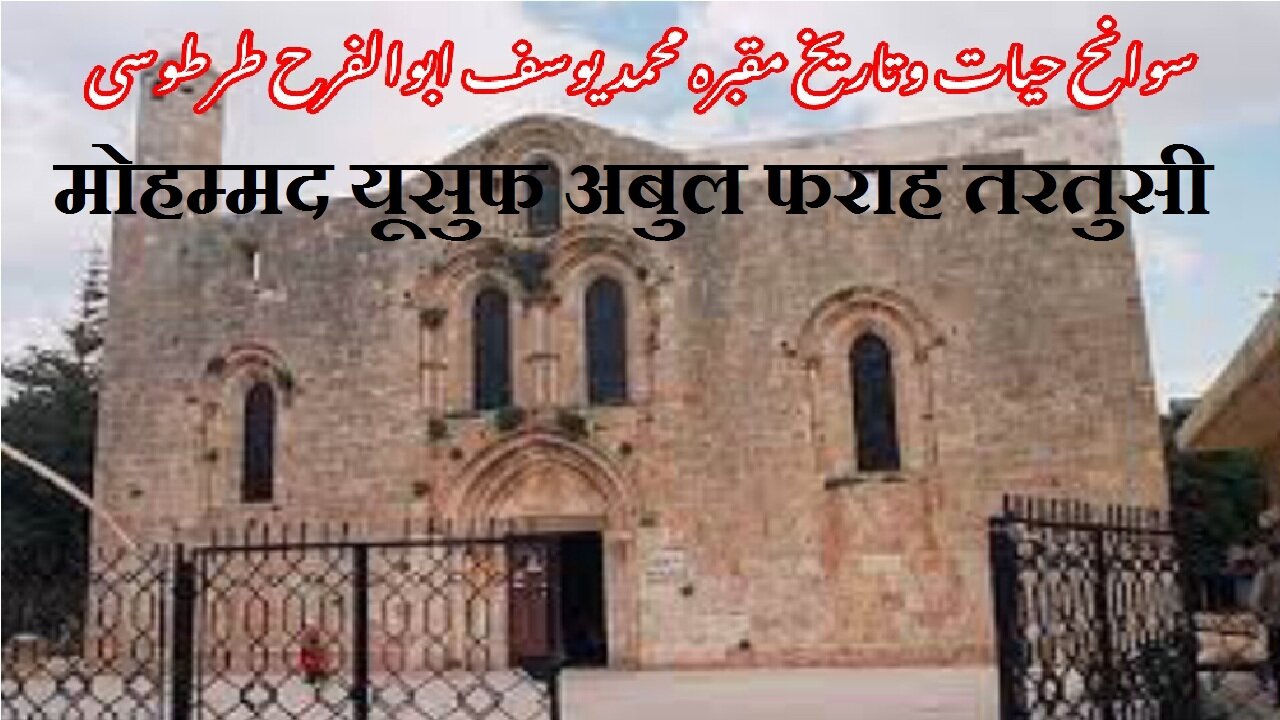Premium Only Content

Mohammad Yousuf अबुल फराह टार्टुसी محمد یوسف ابوالفرح طرطوسی کی سوانح عمری اور مزار کی تاریخ
@islamichistory813 #mohammadyousuf #abulfarah #tartusi #sufisaint #culturalheritage #biography #islamicmysticism #islamicphilosophy #shrine #historicalfigures
Biography of Mohammad Yousuf Abul Farah Tartusi and the history of his shrine
Dekhti Aankhooon aur sountay kaanoon ko Asslamoalaikum, sisters, brothers friends and elders, in informative series videos of Islamic ascolars, sufisaints, cultural heritages, islamic philosophys, islamic mysticisms and historical figures. today we are describing biography of Mohammad Yousuf Abul Farah Tartusi and the history of his shrine.
Mohammad Yousuf Abul Farah Tartusi was a distinguished Islamic scholar, mystic, and spiritual leader born on August 21, 1016 CE (15 Rabi ul Awwal 407 AH) in Tartus, Syria. His contributions to Islamic jurisprudence, theology, and Sufism earned him recognition across the Islamic world. Often given the title Alauddin, his legacy continues to inspire generations of scholars and seekers of knowledge.
Born into a pious family, Mohammad Yousuf was the son of Shaikh Abdullah bin Younus Tartusi. His father was a respected scholar, which provided him with an early exposure to Islamic teachings. From a young age, he exhibited a keen intellect and a profound spiritual inclination, prompting his family to ensure he received an extensive education.
He studied the Quran, Hadith, Islamic jurisprudence (Fiqh), and theology under some of the most renowned scholars of his time. His studies took him across major Islamic learning centers, including Damascus, Baghdad, and Cairo. His thirst for knowledge led him to delve into philosophy, logic, and Sufism, blending rational inquiry with deep spiritual wisdom.
Mohammad Yousuf Abul Farah Tartusi was profoundly influenced by the Sufi traditions of his time. He sought the guidance of spiritual masters and spent years in solitude and meditation. He practiced rigorous self-discipline, emphasizing purification of the soul and devotion to God.
He became associated with various Sufi orders and developed his own following. His teachings emphasized the inner dimensions of faith, urging his disciples to seek divine knowledge through sincerity, patience, and unwavering faith. He was known for his humility, wisdom, and ability to explain complex theological concepts in simple terms.
Mohammad Yousuf made significant contributions to the field of Fiqh, providing insights into legal interpretations and ethical considerations in Islamic law. His works addressed social justice, governance, and morality, making him a key figure in Islamic scholarship.
He authored numerous books and treatises on various aspects of Islam, including Sufism, jurisprudence, and theology. His writings provided guidance on spiritual purification, divine love, and the ethical responsibilities of individuals within society.
His teachings influenced later Sufi scholars, reinforcing the importance of balance between Sharia (Islamic law) and Tariqa (spiritual path). He believed that true enlightenment came from sincere devotion, righteous conduct, and service to humanity.
Mohammad Yousuf Abul Farah Tartusi passed away after a life dedicated to knowledge and spiritual growth. His legacy continues through his disciples and written works, which remain widely studied in various Islamic traditions.
His contributions to Islamic thought, law, and mysticism make him a pivotal figure in the history of Islamic scholarship. His message of love, wisdom, and divine pursuit continues to inspire those seeking spiritual and intellectual enlightenment.
Mohammad Yousuf Abul Farah Tartusi was a beacon of knowledge and spirituality. His dedication to scholarship and mysticism established him as an influential figure in Islamic history. Through his teachings, writings, and disciples, his wisdom endures, offering timeless guidance to those who seek truth and enlightenment.
With this, we seek your permission until tomorrow, tomorrow we will describe the biography of Abu Saeed Mubarak Makhzoomi and the history of his Shrine. Allah Hafiz.
==========================================
-
 18:58
18:58
ISLAMIC HISTORY
1 day agoRabi-ul-Awwal Special Biography of Prophet Muhammad (PBUH) Part-2 سیرت نبوی صلی اللہ علیہ وسلم
101 -
 LIVE
LIVE
Lofi Girl
2 years agoSynthwave Radio 🌌 - beats to chill/game to
267 watching -
 10:03
10:03
The Pascal Show
19 hours ago $4.49 earnedNEW STATEMENT! D.A. Breaks Silence Since Emmanuel Haro Presser... Trying To Shut Up Social Media?!
15K1 -
 1:23:30
1:23:30
TruthStream with Joe and Scott
2 days agoJaime Harlow is back! #483
13.8K13 -
 1:32
1:32
Gaming on Rumble
2 days agoWhat is the Rumble Creator Program?!?! | Lvl UP
61K4 -
 10:34:09
10:34:09
Rallied
14 hours ago $19.95 earnedSolo Challenges ALL DAY
263K9 -
 1:39:43
1:39:43
Brandon Gentile
2 days agoTOP Money Expert: Bitcoin Will Keep Setting All-Time Highs Beyond $10m
17.2K1 -
 2:02:28
2:02:28
Badlands Media
1 day agoDevolution Power Hour Ep. 385: Trump “Death” Hoax, Supreme Court Tariffs Fight, and Tech-Military Ops
71.2K32 -
 1:56:48
1:56:48
Tundra Tactical
8 hours ago $15.33 earnedFull Semi-Auto Comedy Hour
39.5K2 -
 2:07:31
2:07:31
The Connect: With Johnny Mitchell
17 hours ago $10.74 earnedSecrets Of The Cocaine Cowboys: Miami Drug Lord Reveals Truth About His BILLION-DOLLAR Coke Empire
35.9K2